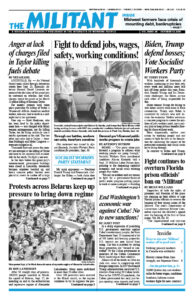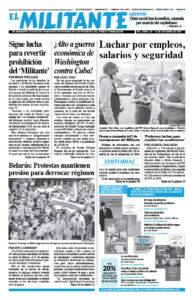In a sharp expansion of punishing U.S. government sanctions against Cuba’s revolutionary people, the State Department Sept. 23 announced a list of 433 hotels and housing properties U.S. tourists are now barred from using. The ban is justified by saying these properties are “owned or controlled” by the Cuban government or members of the Cuban Communist Party leadership or their relatives.
Almost all of the hotels in Cuba are state run, some in cooperation with foreign companies. In 2017 the Donald Trump administration restricted U.S. travelers from using 80 Cuban hotels. Due to the COVID-19 pandemic, the Cuban government has only just begun opening some airports and hotels after shutting them down in March.
Secretary of State Michael Pompeo said in a statement, “Authorized travelers should instead stay in private accommodations, or casas particulares, owned and operated by legitimately independent entrepreneurs.”
The Treasury Department also announced it will restrict “participating in and organizing certain public performances, clinics, workshops, competitions and exhibitions in Cuba,” unless you can get a special license from the government.
In addition, the new measures restrict importation of Cuban alcohol and tobacco products into the U.S.
The goal of the U.S. rulers’ attacks is to make Cuban workers and farmers pay for their overwhelming support to their revolution.
The expanded government restrictions were publicly announced by President Trump, who appeared along with Vice President Mike Pence at an event in the White House to present awards to 23 Cuban American mercenaries. They had been members of Brigade 2506, part of the U.S.-organized counterrevolutionary forces who invaded Cuba at Playa Girón (Bay of Pigs) in April 1961, seeking to overthrow Cuba’s revolutionary government. The invasion was organized by the Democratic administration of President John Kennedy and the CIA, and was defeated in less than three days by a mobilization of the Cuban people.
Cuban President Miguel Díaz-Canel responded that the U.S. rulers’ tightened sanctions “violate the rights of Cubans and Americans. Its cruel and criminal policy will be defeated by our people, who will never renounce their sovereignty.”
Washington’s decadeslong economic war against the workers and farmers of Cuba has been carried out by all 12 of the Democratic and Republican administrations since the victory of the revolution. Fidel Castro and the July 26 Movement toppled the U.S.-back Fulgencio Batista dictatorship Jan. 1, 1959. A trade embargo was imposed by President Dwight Eisenhower in 1960, expanded by Kennedy in 1962, and has been enforced ever since.
Díaz-Canel spoke for Cuba at the U.N. General Assembly’s 75th session, Sept. 22. “The aggressiveness of the blockade has reached a qualitatively higher level that further confirms its role as a concrete, determinant impediment to the functioning of our economy and the development of our country,” he said.
“We call for the unconditional end to the U.S. economic war against Cuba, for an end to all travel restrictions, and demand Washington get out of Guantánamo,” Socialist Workers Party presidential candidate Alyson Kennedy told the Militant. “The Cuban people have resisted the U.S. rulers’ efforts to overthrow their revolution for over 60 years, and will continue to do so.
“What the capitalist families that run the U.S. fear most is the example the Cuban Revolution sets for workers and farmers everywhere, especially in the U.S.,” Kennedy said. “The workers and farmers of Cuba showed us that with class solidarity and leadership, like they have in Cuba, it is possible to stand up to enormous might and seemingly impossible odds and to win.

